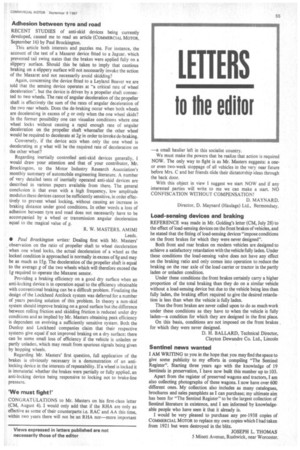• Paul Brockington writes: Dealing first with Mr. Masters' observation
Page 57

If you've noticed an error in this article please click here to report it so we can fix it.
on the ratio of propeller shaft to wheel deceleration when one wheel locks, the actual deceleration of a wheel as the locked condition is approached is normally in excess of 8g and may be as much as 15g. The deceleration of the propeller shaft is equal to the average g of the two wheels which will therefore exceed the lg required to operate the Maxaret sensor.
Providing a braking efficiency on a good dry surface when an anti-locking device is in operation equal to the efficiency obtainable with conventional braking can be a difficult problem. Finalizing the design of the Lockheed Antilock system was deferred for a number of years pending solution of this problem. In theory a non-skid system should improve braking on a good surface but the difference between rolling friction and skidding friction is reduced under dry conditions and as implied by Mr. Masters obtaining peak efficiency is dependent on evolving a sufficiently sensitive system. Both the Dunlop and Lockheed companies claim that their respective systems give equal if not improved braking on a dry surface: there can be some small loss of efficiency if the vehicle is unladen or partly unladen, which may result from spurious signals being given by hopping wheels.
Regarding Mr. Masters' first question, full application of the brakes is obviously necessary in a demonstration of an antilocking device in the interests of repeatability. If a wheel is locked it is immaterial whether the brakes were partially or fully applied, an anti-locking device being responsive to locking not to brake-line pressure.




















































































































